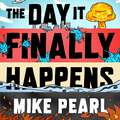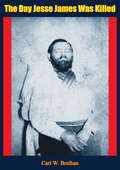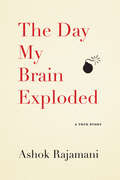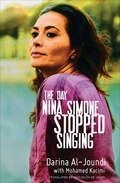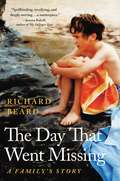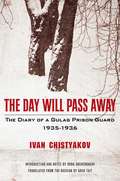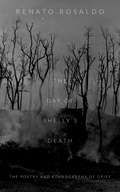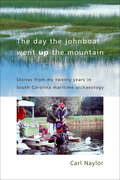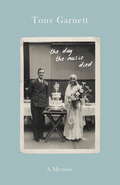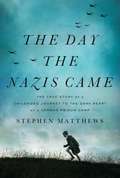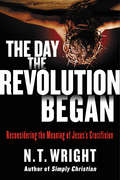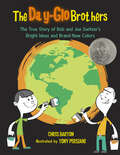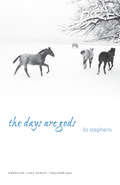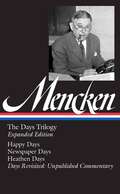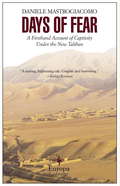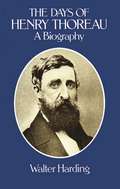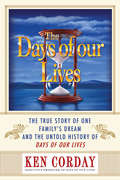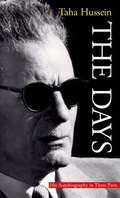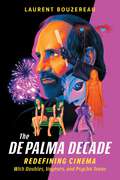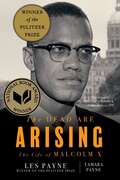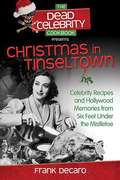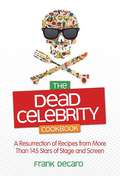- Table View
- List View
The Day It Finally Happens: Alien Contact, Dinosaur Parks, Immortal Humans - And Other Possible Phenomena
by Mike Pearl__________If you live on planet Earth, you're probably scared about the future. Terrorism, complicated international relations, global warming, and a raft of other issues make it hard not to be. Watching the news you have to wonder: is it safe to go out there or not? In The Day It Finally Happens, Mike Pearl games out many of the 'could it really happen?' scenarios we've all speculated about, assigning a probability rating, and taking us through how it would unfold. He explores what would likely occur in dozens of possible scenarios - the final failure of antibiotics, the loss of the world's marine life, the abolition of the British monarchy, and even the arrival of aliens - and reports back from the future, providing a clear picture on how the world would look, feel, and even smell in each of these instances. Hilarious, enlightening, and terrifying, this book makes science accessible and is a unique form of existential therapy, offering practical answers to some of our most worrisome questions. Thankfully, the odds of humanity pulling through look pretty good. __________For fans of such bestsellers as What If?,The Worst Case Scenario Survival Handbook and The Uninhabitable Earth, as well as Steven Pinker and Malcolm Gladwell, this is a book about future events that we don't really understand and getting to know them in close detail. Entertaining speculation featuring both authoritative research and a bit of mischief: a look at how humanity is likely to weather such happenings as the day nuclear war occurs, the day the global internet goes down, the day we run out of effective antibiotics, and the day immortality is achieved.(P) 2019 Simon & Schuster Audio
The Day Jesse James Was Killed
by Carl W. BreihanJesse James is Dead!On April 3, 1882, a bullet fired by Bob Ford from a Smith & Wesson .44 revolver ended the life of Jesse James, notorious badman. Since then, the James story has grown into a full-blown American legend.Here is the dramatic, day-by-day account of the gunman’s lawless adventures—which to some held the bravura of a Robin Hood and to others were wanton banditry—right up to the blood-curdling moment when Jesse is shot down dead in his own parlor.Now, for the first time, new material—drawn from authentic letters, old newspapers, and the personal remembrances of the James family, neighbors, and friends—casts a fascinating light on the motives and deeds of the entire James gang.
The Day My Brain Exploded: A True Story
by Ashok RajamaniAfter a full-throttle brain bleed at the age of twenty-five, Ashok Rajamani, a first-generation Indian American, had to relearn everything: how to eat, how to walk and to speak, even things as basic as his sexual orientation. With humor and insight, he describes the events of that day (his brain exploded just before his brother’s wedding!), as well as the long, difficult recovery period. In the process, he introduces readers to his family—his principal support group, as well as a constant source of frustration and amazement. Irreverent, coruscating, angry, at times shocking, but always revelatory, his memoir takes the reader into unfamiliar territory, much like the experience Alice had when she fell down the rabbit hole. That he lived to tell the story is miraculous; that he tells it with such aplomb is simply remarkable.More than a decade later he has finally reestablished a productive artistic life for himself, still dealing with the effects of his injury—life-long half-blindness and epilepsy— but forging ahead as a survivor dedicated to helping others who have suffered a similar catastrophe.
The Day Nina Simone Stopped Singing
by Mohamed Kacimi Darina Al-JoundiThe Homeland actress&’s &“recollections of her unconventional youth in war-torn Beirut are heartbreaking yet humorous . . . in this unique&” memoir (Publishers Weekly). Raised in 1970s Lebanon on Charles Baudelaire, A Clockwork Orange, and fine Bordeaux, Darina Al-Joundi was encouraged by her unconventional father to defy all taboos. She spent her adolescence defying death in Beirut nightclubs as bombs fell across the city. The more oppressive the country became, the more drugs and anonymous sex she had, fueling the resentment directed at her daily by the same men who would spend the night with her. As the war dies down, she begins to incur the consequences of her lifestyle. On his deathbed, her father&’s last wish is for his favorite song, &“Sinnerman&” by Nina Simone, to be played at his funeral instead of the traditional suras of the Koran. When she does just that, the final act of defiance elicits a catastrophic response from her surviving family members. In this dramatic true story, Darina Al-Joundi is defiantly passionate about living her life as a liberated woman, even if it means leaving everyone and everything behind in this &“beautifully taut and relentlessly unemotional&” memoir (Kirkus).
The Day That Went Missing: A Family's Story
by Richard Beard<P><P>Winner of the PEN/Ackerley Prize 2018 <P><P>On a family summer holiday in Cornwall in 1978, Richard and his younger brother Nicholas are jumping in the waves. Suddenly, Nicholas is out of his depth. One moment he's there, the next he's gone. <P><P>Richard and his other brothers don't attend the funeral, and incredibly the family returns immediately to the same cottage - to complete the holiday, to carry on, in the best British tradition. They soon stop speaking of the catastrophe. Their epic act of collective denial writes Nicky out of the family memory. <P><P>Nearly forty years later, Richard, an acclaimed novelist, is haunted by the missing piece of his childhood, the unexpressed and unacknowledged grief at his core. He doesn't even know the date of his brother's death or the name of the beach where the tragedy occurred. <P><P>So he sets out on a pain-staking investigation to rebuild Nicky's life, and ultimately to recreate the precise events on the day of the accident. <P><P>The Day That Went Missing is a transcendent story of guilt and forgiveness, of reckoning with unspeakable loss. But, above all, it is a brother's most tender act of remembrance, and a man's brave act of survival.
The Day Will Pass Away: The Diary Of A Gulag Prison Guard: 1935-1936
by Arch Tait Ivan ChistyakovA rare first-person testimony of the hardships of a Soviet labor camp—long suppressed—that will become a cornerstone of understanding the Soviet Union. Originally written in a couple of humble exercise books, which were anonymously donated to the Memorial Human Rights Centre in Moscow, this remarkable diary is one of the few first-person accounts to survive the sprawling Soviet prison system. At the back of these exercise books there is a blurred snapshot and a note, "Chistyakov, Ivan Petrovich, repressed in 1937-38. Killed at the front in Tula Province in 1941." This is all that remains of Ivan Chistyakov, a senior guard at the Baikal Amur Corrective Labour Camp. Who was this lost man? How did he end up in the gulag? Though a guard, he is a type of prisoner, too. We learn that he is a cultured and urbane ex-city dweller with a secret nostalgia for pre-Revolutionary Russia. In this diary, Chistyakov does not just record his life in the camp, he narrates it. He is a sharp-eyed witness and a sympathetic, humane, and broken man. From stumblingly poetic musings on the bitter landscape of the taiga to matter-of-fact grumbles about the inefficiency of his stove, from accounts of the brutal conditions of the camp to reflections on the cruelty of loneliness, this diary is an astonishing record—a visceral and immediate description of a place and time whose repercussions still affect the shape of modern Russia, and modern Europe.
The Day of Shelly’s Death: The Poetry and Ethnography of Grief
by Renato RosaldoThis deeply moving collection of poetry by Renato Rosaldo focuses on the shock of his wife Michelle (Shelly) Rosaldo's sudden death on October 11, 1981. Just the day before, Shelly and her family had arrived in the northern Philippine village of Mungayang, where she and her husband Renato, both accomplished anthropologists, planned to conduct fieldwork. On October 11, Shelly died after losing her footing and falling some sixty feet from a cliff into a swollen river. Renato Rosaldo explored the relationship between bereavement and rage in his canonical essay, "Grief and a Headhunter's Rage," which first appeared in 1984 and is reprinted here. In the poems at the heart of this book, he returns to the trauma of Shelly's death through the medium of free verse, maintaining a tight focus on the events of October 11, 1981. He explores not only his own experience of Shelly's death but also the imagined perspectives of many others whose lives intersected with that tragic event and its immediate aftermath, from Shelly herself to the cliff from which she fell, from the two young boys who lost their mother to the strangers who carried and cared for them, from a tricycle taxi driver, to a soldier, to priests and nuns. Photographs taken years earlier, when Renato and Shelly were conducting research across the river valley from Mungayang, add a stark beauty. In a new essay, "Notes on Poetry and Ethnography," Rosaldo explains how and why he came to write the harrowing yet beautiful poems in The Day of Shelly's Death. More than anything else though, the essay is a manifesto in support of what he calls antropoesía, verse with an ethnographic sensibility. The essay clarifies how this book of rare humanity and insight challenges the limits of ethnography as it is usually practiced.
The Day the Johnboat Went Up the Mountain: Stories from My Twenty Years in South Carolina Maritime Archaeology
by Carl NaylorA maritime archeologist recounts twenty years of remarkable discoveries and adventures both in and under the waters of South Carolina.Through personal anecdotes and archeological data, Carl Naylor documents his experiences in the service of the Maritime Research Division of the South Carolina Institute of Archaeology and Anthropology. Along the way he shares a unique foray into the Palmetto State’s history and prehistory.Naylor’s fascinating career includes raising the Confederate submarine H. L. Hunley; dredging the bottom of an Allendale County creek for evidence of the earliest Paleoindians; exploring the waters off Winyah Bay for a Spanish ship lost in 1526 and the waters of Port Royal Sound for a French corsair wrecked in 1577; and many other adventures. He recounts his investigations of suspected Revolutionary War gunboats in the Cooper River, the famous Brown’s Ferry cargo vessel found in the Black River, a steamship sunk in a storm off Hilton Head Island in 1899, and other mysteries of maritime history.Throughout these episodes, Naylor gives an insider’s view of the methods of underwater archaeology in stories that focus on the events, personalities, and contexts of historic finds and on the impact of these discoveries on our knowledge of the Palmetto State’s past. His memoir is a personal, authoritative account of South Carolina’s efforts to discover and preserve evidence of its remarkable maritime history.
The Day the Music Died: A Life Lived Behind the Lens
by Tony Garnett'An extraordinary book by an extraordinary man' Ken LoachTony Garnett's story begins in working-class, war-torn Birmingham where he movingly describes the trauma of his mother's death following a back-street abortion. Nineteen days later, stricken with grief, Tony's father committed suicide and Tony was sent to live with other family members. He eventually moved to London and was part of the counterculture scene in the 1960s.Tony takes us behind the scenes of a selection of his more famous productions, offering secrets and anecdotes, some moving, some amusing. He gives accounts of angry clashes with the BBC and movie executives as he battles to make films that are thought too controversial. Year after year he fought the BBC and movie bosses to bring to the public films about police corruption and psychiatrists' cruelty; films advocating abortion law reform and the abolition of the death penalty; films about the homeless and the waste of young people in poor schools.
The Day the Music Died: A Life Lived Behind the Lens
by Tony Garnett'An extraordinary book by an extraordinary man' Ken LoachTony Garnett's story begins in working-class, war-torn Birmingham where he movingly describes the trauma of his mother's death following a back-street abortion. Nineteen days later, stricken with grief, Tony's father committed suicide and Tony was sent to live with other family members. He eventually moved to London and was part of the counterculture scene in the 1960s.Tony takes us behind the scenes of a selection of his more famous productions, offering secrets and anecdotes, some moving, some amusing. He gives accounts of angry clashes with the BBC and movie executives as he battles to make films that are thought too controversial. Year after year he fought the BBC and movie bosses to bring to the public films about police corruption and psychiatrists' cruelty; films advocating abortion law reform and the abolition of the death penalty; films about the homeless and the waste of young people in poor schools.
The Day the Nazis Came: The True Story of a Childhood Journey to the Dark Heart of a German Prison Camp
by Stephen MatthewsAn poignant and timeless true story of one child&’s journey to a German prison camp during World War II.The Day the Nazis Came is an utterly unique memoir, depicting the world of prison camps through the eyes of a child. Our narrator's parents did their best to protect his emotional well-being, downplaying the extent of dangers and presenting every new day as an adventure. But there is only so much you can do to hide such a dark truth and, by the time he was six years old, Stephen Matthews had actually seen and experienced things of unspeakable horror: he had witnessed a bombardment by the Luftwaffe and had been deported from occupied Guernsey, along with his family, to a prison camp in the heart of Adolf Hitler's Third Reich; he had seen men die in front of him; he had walked alongside Jews coming straight off the cattle-trucks from Bergen-Belsen; he had nearly drowned, been menaced by an Alsatian guard dog, and had his hand broken by a German guard for attempting to feed Russian prisoners. Against all odds, Stephen and his family endured over three years of imprisonment, held together by their will to survive, their love for each other, and the humor they had all been gifted with. But when the war ended and they were set free, the home they eventually returned to had been irremediably scarred and stricken by Nazi occupation and so, once again, they had to fight to pick up the pieces. Supported by and enriched with his mother&’s diary notes, which had been secreted away in an old leather-bound family Bible throughout the years in the camp, The Day the Nazis Came is a phenomenal piece of history as well as a heart-wrenching account of the horrors of the war and deportation. It is, above all, a heart-warming tribute to the preciousness of hope, of life, and of the indomitable spirit of man to survive. And while honoring the memory of the three courageous Germans who risked everything to protect as many as the prisoners in their charge as they could, it also shows how human kindness may flower and prevail in the unlikeliest of places.
The Day the Revolution Began: Reconsidering the Meaning of Jesus's Crucifixion
by N. T. WrightThe renowned scholar, Anglican bishop, and bestselling author widely considered to be the heir to C. S. Lewis contemplates the central event at the heart of the Christian faith--Jesus' crucifixion--arguing that the Protestant Reformation did not go far enough in transforming our understanding of its meaning.In The Day the Revolution Began, N. T. Wright once again challenges commonly held Christian beliefs as he did in his acclaimed Surprised by Hope. Demonstrating the rigorous intellect and breathtaking knowledge that have long defined his work, Wright argues that Jesus' death on the cross was not only to absolve us of our sins; it was actually the beginning of a revolution commissioning the Christian faithful to a new vocation--a royal priesthood responsible for restoring and reconciling all of God's creation. Wright argues that Jesus' crucifixion must be understood within the much larger story of God's purposes to bring heaven and earth together. The Day the Revolution Began offers a grand picture of Jesus' sacrifice and its full significance for the Christian faith, inspiring believers with a renewed sense of mission, purpose, and hope, and reminding them of the crucial role the Christian faith must play in protecting and shaping the future of the world.
The Day the Voices Stopped: A Schizophrenic's Journey from Madness to Hope
by Ken Steele Claire BermanAt fourteen Ken Steele suddenly began to hear voices which berated him and urged him to kill himself. For the next 34 years the voices were his constant companion as he drifted through the mental-health system and the homeless shelters of America's cities. Finally, with the help of a therapist who found the right combination of medications and helped him stay with his treatment regimen, Steele regained his mental health. The voices stopped. Steele spent the last years of his life as a mental patients' activist, working for the rights of the mentally ill.
The Day-Glo Brothers: The True Story of Bob and Joe Switzer's Bright Ideas and Brand-New Colors
by Chris BartonA discovery that made the world a brighter place!Joe and Bob Switzer were very different brothers. Bob was a studious planner who wanted to grow up to be a doctor. Joe dreamed of making his fortune in show business and loved magic tricks and problem-solving. When an accident left Bob recovering in a darkened basement, the brothers began experimenting with ultraviolet light and fluorescent paints. Together they invented a whole new kind of color, one that glows with an extra-special intensity—Day-Glo.This cover reproduction is not printed with Day-Glo colors. The actual book, however, is printed using three Day-Glo colors: Saturn Yellow, Fire Orange, and Signal Green.
The Days Are Gods (American Lives)
by Liz Stephens“I called the bishop of the local ward, and he put the date of your move into the church bulletin, and these gentlemen came to help,” Brady, the real estate agent, says. Welcome to Wellsville, Utah. Good-bye, L.A. Liz Stephens has come from Los Angeles to Utah for graduate school, and her brief stint working on a Taco Bell commercial is not much in the way of preparation for taking on the real West. In The Days Are Gods Stephens chronicles a move that is far more than a shift in geographical coordinates. With husband and dogs in tow, she searches for an authentic connection to this new community, all the while knowing that as an outsider she will never really belong. And yet precisely as an outsider, Stephens has a unique perspective on belonging, one that colors her accounts of attending her first small-town rodeo, living in the thick of a thriving Latter Day Saints religious community, raising goats in her laundry room, and observing the town’s racialized Founder’s Day battle reenactments. In her frank and particular way, Stephens shows how the culture of memory, as our inheritance, offers a balance to our brief attention spans and our brief lives.
The Days Before Yesterday
by Lord Frederic HamiltonLord Frederick Spencer Hamilton was a Conservative Party politician in the United Kingdom, the sixth son of James Hamilton, 1st Duke of Abercorn and Lady Louisa Jane Russell. Lord Frederick also wrote the books "Here, There and Everywhere", "The Days Before Yesterday" and "Vanished Pomps of Yesterday".
The Days Trilogy
by H. L. MenckenA major literary event: Mencken’s dazzling autobiography, with 200 pages of his own never-before-published commentary and photos. In 1936, at the age of fifty-five, H. L. Mencken published a reminiscence about his boyhood in The New Yorker, beginning a long and magnificent adventure in autobiography by America’s greatest journalist. Mencken went on to gather his childhood recollections in Happy Days (1940), a richly detailed, poignant account of growing up in Baltimore. A critical and popular success, the book surprised many with its glimpses of a less curmudgeonly Mencken, and there soon followed the absorbing sequels Newspaper Days (1941), charting his rise at the Baltimore Herald from cub reporter to editor, and Heathen Days (1943), recounting his varied excursions as journalist and public figure, including his coverage of the Scopes trial in 1925. But unknown to the legions of Days books’ admirers, Mencken continued to add to them after publication, annotating and expanding each volume in typescripts sealed to the public for twenty-five years after his death. Until now, most of this material—often more frank and unvarnished than the original Days books—has never been published. Containing nearly 200 pages of previously unseen writing, and illustrated with photographs from Mencken’s archives, many taken by Mencken himself, this expanded and definitive edition of the Days trilogy is a cause for celebration.
The Days of Fear
by Daniele MastrogiacomoOn March 5, 2007, Daniele Mastrogiacomo, his driver and his interpreter were captured by the Taliban. His captors threatened to execute him if Italy did not immediately withdraw its troops from Afghanistan. When Italy refused this demand, the driver, twenty-five-year old Sayed Agha, was decapitated before Mastrogiacomo?s eyes. A video of this horrifying event was shown around the world, and Mastrogiacomo spent the rest of his time in captivity convinced that a similar fate would soon befall him. His jail, however, was not a dark room hidden away in some urban periphery, but a kind of open-air prison: to escape detection, his captors dragged him from village to village, through opium plantations, along dusty roads and over rugged mountains, from one end of Afghanistan to the other. It was a captivity that consisted in a continuous and nerve-racking confrontation with a world that bore no resemblance to that which he had ever known. Mastrogiacomo draws from his experience not only a hostage?s tale of captivity but also a story that lies at the heart of the eternal human drama: that of a man?s encounter with The Other. As brilliantly crafted as a first-rate suspense novel and with the kind of emotional impact associated with the best literary fiction, Mastrogiacomo?s story of courage and tenacity in the face of imminent danger is unforgettable. .
The Days of Henry Thoreau
by Walter Harding"The best biography we have had." -- Carl Bode, The New York Times Book ReviewHenry David Thoreau is generally remembered as the author of Walden and "Civil Disobedience," a recluse of the woods and political protester who once went to jail. To his contemporaries he was a minor disciple of Emerson; he has since joined the ranks of America's most respected and beloved writers. Few, however, really know the complexity of the man they revere -- wanderer and scholar, naturalist and humorist, teacher and surveyor, abolitionist and poet, Transcendentalist and anthropologist, inventor and social critic, and, above all, individualist.In this widely acclaimed biography, outstanding Thoreau scholar Walter Harding presents all of these Thoreaus. Scholars will find here the culmination of a lifetime of research and study, meticulously documented; general readers will find an absorbing story of a remarkable man. Writing always with supreme clarity, Professor Harding has marshaled all the facts so as best to "let them speak for themselves." Thoreau's thoughtfulness and stubbornness, his more than ordinarily human amalgam of the earthy and the sublime, his unquenchable vitality emerge to the reader as they did to his own family, friends, and critics.You will see Thoreau's work in his family's pencil factory, his accidental setting of a forest fire, his love of children and hatred of hypocrisy, his contributions to the scientific understanding of forest trees, and other more and less familiar aspects of the man and his works. You will find the social as well as the reclusive Thoreau. Reactions to him by such notable contemporaries as Margaret Fuller, Nathaniel Hawthorne, and Walt Whitman -- with Thoreau's responses to them -- are given in rich detail.The totality is as complete, accurate, fair, vivid, and fully rounded a portrait as has ever been drawn. On its appearance, Professor Harding's work immediately established itself as "the standard biography" (Edward Wagenknecht). It has never been superseded. For this Dover edition, the author has corrected minor errors, provided an appendix bibliographically documenting hundreds of facts, and contributed an Afterword updating some of his findings and discussing Thoreau scholarship.
The Days of our Lives
by Ken CordayOn a November day almost forty-five years ago, the first episode of Days of our Lives appeared on the NBC Network, NBC's first color soap opera broadcast. Eleven thousand episodes later, millions excitedly tune in every weekday to watch one of the 260 original one-hour episodes produced each year. What few know though is that the show started as the dream of one family, the Corday family, who still owns and runs the show to this day. These are the days of their lives. The Days of our Lives is the first insider account of the history behind one of our most beloved soap operas. It is about the family who believed in it, conceived it, and sometimes seemed to live it along with millions of viewers, as they struggled to emerge from nowhere to create and produce one of the most successful and enduring television shows in history. Ken Corday reveals the triumphs and tragedies behind the scenes over the years, a moving personal story of a family facing everything from death to mental illness, the ever-looming threat of cancellation, and the struggle to keep their dream alive. It is also the story of an extended family-actors, producers, and crew-who formed a bond of love that went beyond just creating a show to establishing a legacy. You will discover for the first time the true stories behind the show, a story of living a dream and raising a family while things all around you, even fate, seem to conspire against you-and succeeding against all odds.
The Days: His Autobiography in Three Parts
by Taha HusseinFor the first time, the three-part autobiography of one of modern Egypt's greatest writers and thinkers is available in a single paperback volume. The first part, An Egyptian Childhood (1929), is full of the sounds and smells of rural Egypt. It tells of Hussein's childhood and early education in a small village in Upper Egypt, as he learns not only to come to terms with his blindness but to excel in spite of it and win a place at the prestigious Azhar University in Cairo. The second part, The Stream of Days: A Student at the Azhar (1939), is an enthralling picture of student life in Egypt in the early 1900s, and the record of the growth of an unusually gifted personality. More than forty years later, Hussein published A Passage to France (1973), carrying the story on to his final attainment of a doctorate at the Sorbonne, a saga of perseverance in the face of daunting odds.
The De Palma Decade: Redefining Cinema with Doubles, Voyeurs, and Psychic Teens
by Laurent BouzereauJourney with award-winning filmmaker and author Laurent Bouzereau through acclaimed director Brian De Palma&’s renowned—and controversial—horror and thriller films that redefined cinema in the 1970s and early 80s with interviews conducted over three decades and fresh takes. Among a crop of fresh filmmakers including Steven Spielberg, George Lucas, Martin Scorsese, and Francis Ford Coppola revolutionizing Hollywood in the &’70s, Brian De Palma—a director from Philadelphia with a few social satires under his belt—charted a cinematic path unlike any of his peers. At times he was unfairly dismissed as a Hitchcock copycat; other times he was misunderstood for his peculiar mix of sexuality, humor, and violence. But, over the course of ten years, he created a new cinematic language, melding his signature themes with specific filmmaking techniques that are now synonymous with his name. Acclaimed filmmaker Laurent Bouzereau explores the seven films that came to define the De Palma decade: Sisters, Phantom of the Paradise, Obsession, Carrie, The Fury, Dressed to Kill, and Blow Out. Combining film analysis, detailed production histories, and interviews with De Palma himself, his casts, and collaborators, Bouzereau presents the definitive record on this unrivaled period of cinematic creativity and the emergence of an auteur who would continue to influence filmmaking in the decades that followed.
The Dead Are Arising: The Life Of Malcolm X
by Les Payne Tamara PayneAn epic, award-winning biography of Malcolm X that draws on hundreds of hours of personal interviews and rewrites much of the known narrative. Les Payne, the renowned Pulitzer Prize–winning investigative journalist, embarked in 1990 on a nearly thirty-year-long quest to create an unprecedented portrait of Malcolm X, one that would separate fact from fiction. The result is this historic, National Book Award–winning biography, which interweaves previously unknown details of Malcolm X’s life—from harrowing Depression-era vignettes to a moment-by-moment retelling of the 1965 assassination—into an extraordinary account that contextualizes Malcolm X’s life against the wider currents of American history. Bookended by essays from Tamara Payne, Payne’s daughter and primary researcher, who heroically completed the biography after her father’s death in 2018, The Dead Are Arising affirms the centrality of Malcolm X to the African American freedom struggle.
The Dead Celebrity Cookbook Presents Christmas in Tinseltown: Celebrity Recipes and Hollywood Memories from Six Feet Under the Mistletoe
by Frank DeCaroThe toast of Christmas past is back and not a moment too soon! In The Dead Celebrity Christmas Cookbook, Frank DeCaro serves up culinary delights from Edmund Gwenn's Christmas Cup to Bing Crosby's Sugar Cookies and celebrates the best of the season's movies, TV specials, and music. Recipes from such late luminaries as Natalie Wood, Judy Garland, Burl Ives, Dinah Shore, and even Boris Karloff are featured in chapters saluting fabulous amusements like Miracle on 34th Street, Meet Me in St. Louis, Rudolph the Red-Nosed Reindeer, Pee-wee's Playhouse Christmas Special, and How the Grinch Stole Christmas. Plus recipes from singers like Eartha Kitt ("Santa Baby"), Elvis Presley ("Blue Christmas"), and John Lennon ("Happy Xmas (War is Over)") celebrate the best holiday platters.
The Dead Celebrity Cookbook: A Resurrection of Recipes by More Than 145 Stars of Stage and Screen
by Frank DeCaroIf you've ever fantasized about feasting on Frank Sinatra's Barbecued Lamb, lunching on Lucille Ball's "Chinese-y Thing," diving ever-so-neatly into Joan Crawford's Poached Salmon, or wrapping your lips around Rock Hudson's cannoli – and really, who hasn't? – hold on to your oven mitts! In The Dead Celebrity Cookbook: A Resurrection of Recipes by 150 Stars of Stage and Screen, Frank DeCaro—the flamboyantly funny Sirius XM radio personality best known for his six-and-a-half-year stint as the movie critic on The Daily Show with Jon Stewart—collects hundreds of recipes passed on from legendary stars of stage and screen, proving that before there were celebrity chefs, there were celebrities who fancied themselves chefs. Their all-but-forgotten recipes—rescued from out-of-print cookbooks, musty biographies, vintage magazines, and dusty pamphlets—suggest a style of home entertaining ripe for reexamination if not revival, while reminding intrepid gourmands that, for better or worse, Hollywood doesn't make celebrities (or cooks) like it used to.StarringFarrah Fawcett's Sausage and PeppersLiberace's Sticky Buns Bette Davis's Red Flannel Hash Bea Arthur's Good Morning Mushroom Tomato Toast Dudley Moore's Crème BrûléeGypsy Rose Lee's Portuguese Fish ChowderJohn Ritter's Famous Fudge Andy Warhol's Ghoulish Goulash Vincent Price's Pepper SteakJohnny Cash's Old Iron Pot Family-Style Chili Vivian Vance's Chicken Kiev Sebastian Cabot's Avocado Surprise Lawrence Welk's Vegetable Croquettes Ann Miller's Cheese SouffléJerry Orbach's TrifleTotie Fields's Fruit MellowIrene Ryan's Tipsy Basingstoke Klaus Nomi's Key Lime TartRichard Deacon's Bitter and BoozeAnd many other meals from breakfast to dessert.
